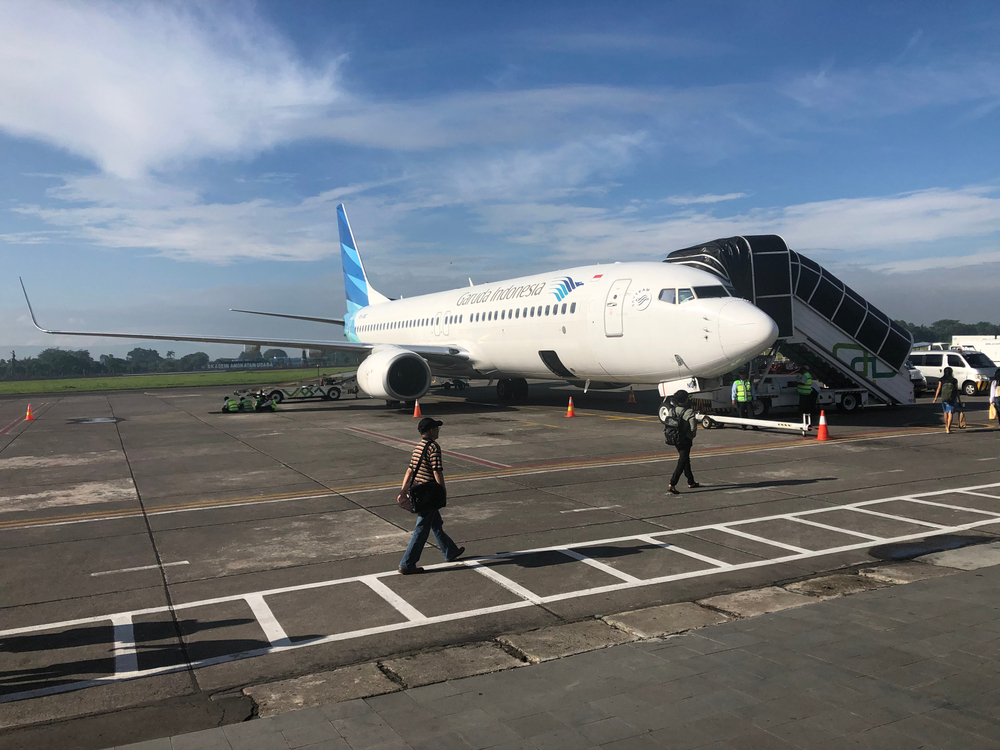Indonesia’s Garuda confident of restructuring debt as it’s severely hit by COVID-19
JAKARTA – National carrier Garuda Indonesia will restructure its liabilities amid tight cashflow as the travel industry takes a significant hit due to the COVID-19 pandemic, Irfan Setiaputra, its CEO told Salaam Gateway.
The listed company is currently in “survival mode” after being disrupted by the global health crisis.
“It’s very challenging. Initially we monitor (passenger traffic) on a weekly basis, but at the moment we already monitor on a daily basis,” said Irfan, who became CEO just three months ago.
“The problem is our cashflow because the invoices are getting low, and the costs remain the same.”
Garuda Indonesia has $3.43 billion in short-term liabilities, or debt of less than a year, in total. One of the biggest is its $496.8 million global sukuk issued on Jun 3, 2015, which is due to mature on Jun 3, according to the company’s latest available financial report released in September last year.
The company majority-owned by the Indonesian government is “severely affected” by the pandemic with no income from umrah flights, after Saudi Arabia halted pilgrims on Feb 27, as well as to and from Australia that has closed its borders, state-owned enterprises minister Erick Thohir told local press on Friday (Mar 20).
Irfan admitted that in the last two months, the company has been talking with lessors and lenders and asking them to understand Garuda’s situation due to the pandemic. The company believes it has the capability and credibility to restructure its financing. According to Irfan, some have responded positively.
“We have been negotiating for more than a month with lessors and lenders. It’s not like we aren’t committing to what we promise to them, but we need them to understand the current situation. If they are less concerned about it and push us into a corner, I will simply terminate our relationship. I believe partnership is about understanding each other,” he said.
The CEO also said the company is exploring alternatives other than restructuring, giving refinancing with the support of four state-owned lenders as an example.
“We are also in discussions with several banks outside Indonesia and also four state-owned banks,” said Irfan.
“The progress is quite positive, we are finalising the term sheet, and since we are 60% owned by the Ministry of State-Owned Enterprises, they will help us. For sure there is zero probability of default for us on these notes.”
He said that with the government agencies, Garuda hopes to refinance rather than restructure its debts.
The CEO is still optimistic about Garuda’s business, citing domestic flights as a bright spot. Around 80% of Garuda’s passengers are domestic.
“Compared to other hub-based airlines, we are in a better position. Thanks to a huge domestic market separated by 17,000 islands, our revenue mainly comes from the domestic market,” he said.
He added that the recent fall in oil prices, of around 13% on a year-to-year basis, hasn’t been entirely useful for airlines, since some carriers hedge their fuel prices and there’s also a mixed effect from the dollar strengthening against other currencies.
“The benefit is still there but not too much. So today maybe that impact isn’t as huge as on a good day,” said the CEO.
BEYOND RESCHEDULING, REROUTING AND REFUNDS
For Garuda, survival during the pandemic means rescheduling, rerouting and refunding flights but the airline is also looking beyond the crisis.
Irfan said he has already discussed with authorities from India, Australia, Russia, New Zealand, Germany, and France about direct flights from Jakarta and Denpasar to several cities in those countries.
“We are talking with several authorities about the possibility to have direct flights,” said Irfan.
“Some of them are like: ‘Are you crazy?’ I said yes, we are talking now, but we are going to execute it later once the pandemic is over.”
Garuda is also obliged to help the government repatriate citizens from infected countries, as an evacuation partner.
“Are we going to lose money on that flight? For sure. Flying five to ten people per day doesn’t make any sense business-wise. We still lose money by not flying. So rather than that, let’s fly.”
“In the current situation it is stated very clearly that the government is responsible to make sure Indonesians abroad are safe and if they want to come back, we will fly them back,” he added.
BAD PATCH
Although the airline industry in general is critically hit and there is a low demand for travel due to bans and restrictions, Irfan believes there is still hope.
He believes the demand is still there but sentiments such as fear are running high. People still want to travel and holiday. Perceptions must be well managed, and soon.
“Well, this business has been very challenging for years, the competition is tough and the margin is so low, but I do see there should be a huge opportunity on the revenue side not only from aero side or non-aero, like cargo or advertisements, but from other channels,” said the Garuda chief.
He said he is discussing “with the younger generation” how to leverage Garuda’s 26 million passengers a year.
“I think there should be meaningful ways to generate revenue and help us to get better margins from this business, plus making the passenger happy,” he said.
“For a full services carrier like us, the key is to increase our service quality.”
(Reporting by Yosi Winosa; Editing by Emmy Abdul Alim emmy.abdulalim@salaamgateway.com)
© SalaamGateway.com 2020 All Rights Reserved
